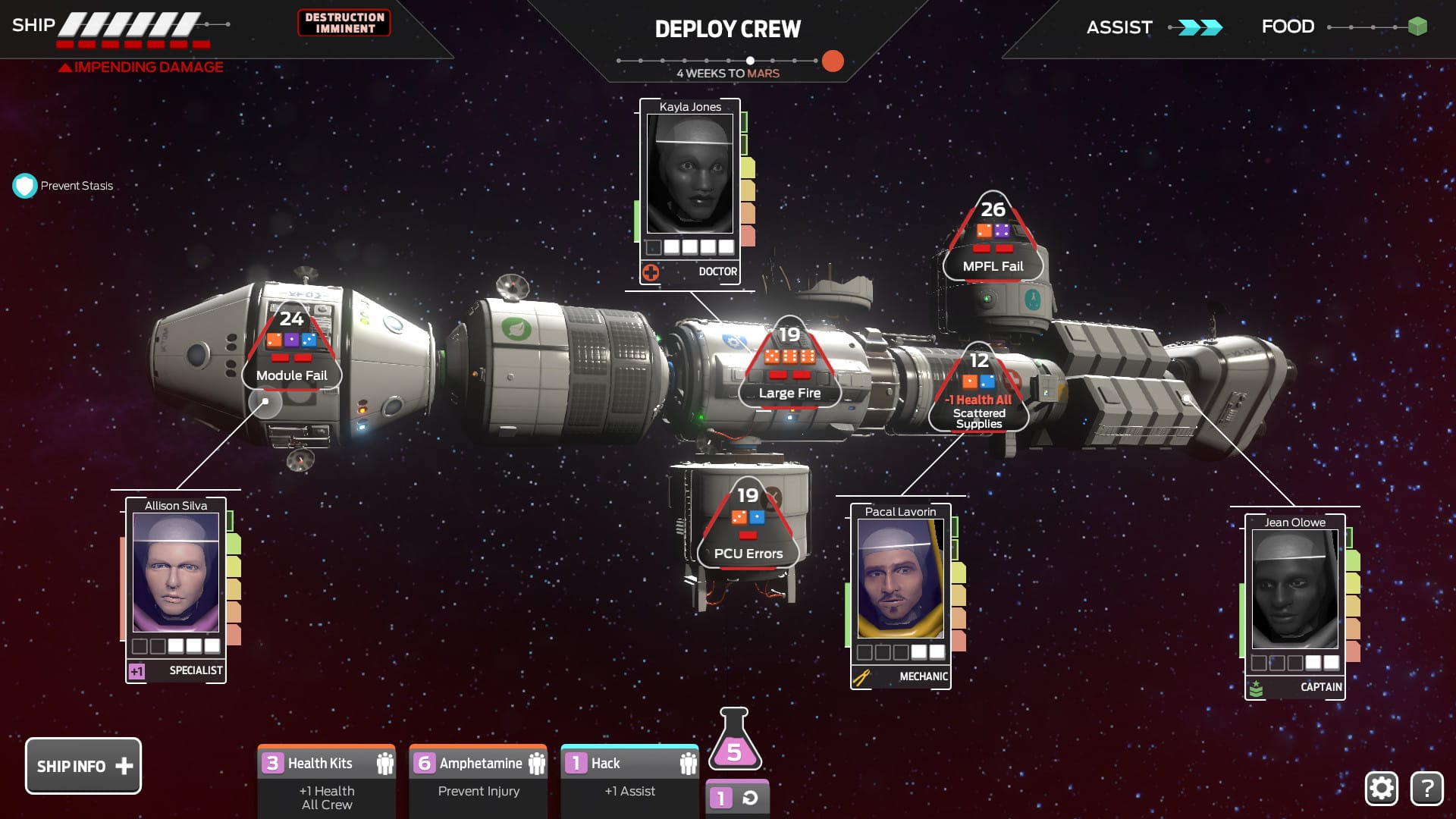In praise of the “bad” design of Tharsis

Tharsis begins with an event of astronomical improbability. Somewhere in the interplanetary medium, a meteoroid floating through space at 25 miles a second occupies the same bit of spacetime as the spaceship Inktomi, which is hurtling towards Mars at 11 miles a second. The ship and its crew have been travelling for weeks; the meteoroid, millenia. And there, in the emptiness of the cosmic void, they somehow meet. An impact; a burst of compressed air; a body blown into space; a crippled vessel drifting toward Mars. What remains is a quartet of crew and a fistful of dice to navigate the chain-reaction of failures that stand between the Inktomi and its destination, an unknown transmission from the Tharsis region of Mars. Success is about as likely as it seems.
As much a boardgame as it is a videogame, Tharsis—the third game from the Santa Cruz-based studio Choice Provisions—takes the crisis management of Faster than Light (2012) and pairs it with a taut, elegant, and maddening ruleset reminiscent of Pandemic (2007). On each of the game’s 10 turns (representing 10 weeks of travel), a new calamity arises—broken air filter, electrical fire, etc.—demanding the crew’s time and resources. Worse, the mere act of movement between ship modules injures the crew, and the team becomes less effective as food runs out and tensions rise (cannibalism is more-or-less inevitable). But even a player who has mastered the delicate art of distributing crew resources faces a bigger challenge: the whims of chance. Fixing anything depends on rolling specific numbers; bad rolls cause injury, or worse.
the game is nasty, brutish, and short
Sounds unfair? It is. Despite the obvious care that went into designing Tharsis (one telling detail: post-cannibalism, the dice turn a grim shade of red), the game is nasty, brutish, and short, which helps account for the lukewarm critical response it has received. In an emblematic negative review, Tyler Wilde of PC Gamer writes that the game is “too random and murderous to be enjoyable.” He has a point. It took me nearly two dozen attempts to win Tharsis, and I suspect that a significant percentage of games of Tharsis are mathematically unwinnable by the second turn. When I finally did win, my success had less to do with my growing comfort with Tharsis’ mechanics and more with a long string of favorable rolls. The sole survivor of my trip to Mars, near-death and newly cannibalistic brought me no sense of achievement. After all, what did I do but get some lucky dice? What I actually felt was closer to a sense of empty relief that I’d scraped by through no doing of my own.
So, yes, it’s perfectly true that Tharsis is intensely unforgiving, unfair, and unsatisfying. But what’s at stake when we take that to mean that Tharsis is “bad”? To be sure, there are worse criteria for evaluating the quality of a game, but, under this logic, games can be “good” only insofar as they are able to fluff the player’s ego. What creative possibilities does this solipsism, this belief that we deserve fair play from our games, foreclose? Is it possible to dissuade ourselves of the notion that an unfair game is a poorly designed game? I’m not suggesting that games should be easy, of course—Super Meat Boy (2010), Dark Souls (2011), and any other number of excellent “hardcore” titles present a bigger challenge than Tharsis. But the difficulty of these games has nothing to do with “fairness.” If anything, Super Meat Boy is relentlessly predictable, the opposite of what makes Tharsis so challenging. Still, if we accept that games have no responsibility to provide us success or closure, what kinds of interpretive horizons do we open up? What do we permit games to say that they couldn’t say before?

From this perspective, Tharsis isn’t the carelessly designed, poorly balanced dud that a number of critics have made it out to be. Instead, we can read the game as a meditation on the existence and inescapability of randomness, the imbalance of human perception with our astral insignificance, and how we might recognize and transcend—or at least come to terms with—our self-centeredness.
Aristotle is often credited as the first philosopher to take seriously the idea of chance, which he examines in his study of being, Metaphysics. Events, Aristotle writes, have four fundamental causes (“material,” “efficient,” “formal,” and “final”) which, together, he calls “aetiology,” the root of our modern term “etiology,” the study of and search for causality. Yet aetiology, in Aristotle’s telling, doesn’t account for every phenomenon in the natural world; there are also “accidents,” which occur without recourse to the four fundamental causes. As he explains, “there isn’t any definite cause for an accident, but only chance, namely, an indefinite cause.”
a meditation on the existence and inescapability of randomness
“Indefinite” to whom? Aristotle’s point isn’t that accidents don’t have causes, but that the causes of accidents are not and cannot be known by a human subject (that’s what makes them accidents). In other words, any event whose causes are sufficiently obscure can only be perceived as “random,” which means that randomness is not something that exists in the world, but is rooted in human perception and knowledge (or, more likely, lack thereof). Moreover, the need to label events without obvious causes as “random” is emblematic of the idealist impulse to place human consciousness at the center of being, regulating and organizing the world around us as if it only exists for us.
To the luckless astronauts of the Inktomi, the meteoroid that “randomly” occupies the same place and moment in spacetime as their vessel surely takes on a significance as big as life itself. The impact must also seem like a stroke of absurdly bad luck. But there’s nothing unpredictable about the path of a meteoroid, pulled along through space for an eternity by the forces described in Newton’s Universal Law of Gravitation. The only reason this particular meteoroid acquires significance—indeed, has its “being” bestowed upon it—is because it becomes an object of human tragedy. (Consider also: astrophysical convention states that a meteoroid becomes a meteorite at the moment of impact—that is, its “nature” changes the moment it comes into contact with the human). The only perspective from which the meteoroid’s appearance is “random” is that of the myopic human, unwilling to entertain the being of objects before they commune with humanity.

In the last decade, philosophical realists have labeled this form of solipsism “correlationism,” the fallacy that the world exists only as a correlate of the mind. Why should human subjectivity, this new realism holds, be the ontological center of existence? How self-centered we are to believe, as Judge Holden of Cormac McCarthy’s Blood Meridian exclaims, that “whatever in creation exists without [our] knowledge exists without [our] consent.” When we limit ourselves to what is and can be known by humans, we cut ourselves off from the messiness of existence in all its forms. Call that nihilism if you must, but what’s at stake in this seemingly eternal debate between idealism and realism is nothing less than the place and meaning of humanity in the horrific, godless brutality of being.
Tharsis helps us see this, and can help us come to terms with our existence in a universe that exhibits a profound disinterest to the reality of human life. Rejecting the conventional flow of play that exists solely to be mastered and overcome, Tharsis cheats us of the success and closure we thought we deserved. Nowhere is this more obvious than in Tharsis’s inescapable dependency on chance, reimagined not as a defect but a feature. Many videogames use pseudo-random distribution as a crucial element of simulation, but Tharsis goes to unprecedented lengths to make these mechanics not only essential to victory but highly visible. More than a reference to the tabletop boardgames that inspired Tharsis, the rolling of dice directly atop the action suggests the conceptual importance of chance, in addition to its mechanical importance.
Each thing simply is
Accepting that a game need not exist to be won strikes me as one step toward accepting that the universe does not exist for us, nor in spite of us, but alongside us. A curious blindspot in our cultures of criticism says something larger about the place of humanity in being. Because out there in the interplanetary medium, there is no god to petition for mercy and no government to establish dominion. We can cower before the callousness of being, or we can accept it and find a way to live with it; even in deep space, there’s nothing malicious about a meteorite, an electrical fire, or a faulty power compressor. No matter how devastating their effects are, they bear no ill-will towards their victims. Each thing simply is; it did not come in peace, nor in conflict, neither savior, nor foe; they simply are, carrying on in the unbearable meanwhile of being.
So it matters that Tharsis is a game of chance, and it matters that chance has to be enough. Ignore it if you want—I doubt anyone would blame you. Tharsis might not be a “great game,” but if we suspend our solipsism for a moment, it can teach us something about human endeavor in an indifferent universe. Something grotesque, something disquieting, but something we should learn all the same.
After all, what is our earth—our home, our pale blue dot—if not a spaceship?



